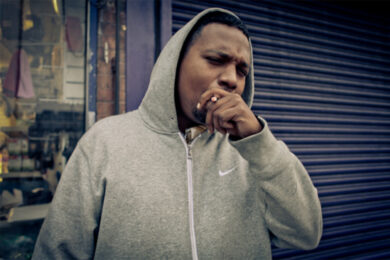No one, not even DJ Rashad Harden, could have anticipated the phenomenal rise of footwork. To tell his story is to tell the story of the lo-tech boom-bassin’ genre he first helped pioneer all those years ago. Having spent a lengthy gestation period in the suburbs of Chicago’s underground, footwork is now a going concern for dance aficionados the world over. But just as footwork was born almost entirely out of necessity into the basements and gym halls of the city’s dance-battle scene, so too is it now having to adapt to its newfound platform.
Indeed, on his most recent EP, Rollin’, out now on Hyperdub, it’s possible to hear Rashad expanding his sound, drawing in a wide range of samples and signifiers from jazz and funk, hip-hop and especially drum & bass, splicing them together and peppering them across his trademark fragmented drum machine percussion. It’s further proof that footwork is transcending the common misconceptions of it as being ‘difficult’ or ‘utilitarian’ music, plumbing remarkable emotional depths within its off-grid, helter-skelter rhythms.
Rashad was one of the first footwork producers to bring the style from out of its Chicago stronghold and onto dancefloors across the US and Europe. For him, this ‘functional’ label no longer applies. "I think it could be treated as its own thing [at this point]," he declares. "A lot of people got the concept you had to footwork to the music or else there’s just no purpose, but obviously people were wrong. If I go to New York or California they don’t do a lot of footworking, they just dance.
"My goal is now, that you don’t have to footwork or dance. As long as you get into it and enjoy it, that’s cool. You don’t have to know certain moves to get down with the music. Just have a good time. That’s what I’m trying to have and get across to people. As long as you feel the rhythm and the bass, just vibe with it, you’ll be alright. It’s for everybody, not just footworkers."
‘Rollin’
The genre is still relatively new to most – the world at large was introduced to footwork via a string of releases from UK label Planet Mu, and especially their two Bangs & Works compilations, which drew together tracks from across the style and gave some sense of its diversity. Its story, however, begins much earlier: in the late 90s, when Chicago producers started experimenting with a faster, more scrambled take on the prevalent juke style. "Before footwork and juke it was ghetto-house and techno," recalls Rashad. "There was a record label called Dance Mania, featuring people like DJ Deeon, DJ Funk, Jamming Gerald, Traxman, Paul Johnson – a lot of Chicago legends, if you will. My friend Gant Man came up with a phrase, I forgot how exactly he and Puncho came up with it, but they made a track [called ‘Juke It’]. People took that song and labelled the genre juke."
A young Rashad, along with longtime friend and collaborator DJ Spinn, was given the opportunity to release through Dance Mania. However, the label folded before the tracks saw the light of day. "They shut down on us. They closed due to some tax problems or whatever… but we just kept going with it. We were doing darker shit – weirder, more distorted-bass sounding techno-ish sounds. The dancers who liked it labelled that style footwork, while juke was the more commercial shit we were doing."
Fellow Chicago resident RP Boo is credited as having first put juke through the footwork blender for his track ‘Baby C’mon’ in 1997. By 1999, a legion of producers and dancers had solidified the blueprint for a whole new scene, complete with its own dance moves and hangouts. Kick drums were largely shorn from the music, replaced with high-density bass pressure that resisted cathartic release while maintaining a constant sense of propulsion and intensity. Snare hits no longer drove the tune on the 2 & 4, preferring to stab and kick the track along like a tin can. Rapid hi-hat rolls switched randomly from regular to double and triplet time, causing mind and body to negotiate a contorted obstacle course exemplified by the tricky dance moves pulled off at footwork events.
Most notably, samples were chopped into tiny unrecognisable snippets; looping, repeating and interrupting themselves until they took on disorienting new forms. "People can relate to a sample," says Rashad, "It gets stuck in your head. If it’s a sample that I’ve heard or it’s a song that I like, I’ll just fuck around and chop it up and see how it sounds. Sometimes it’s something that I hear – I don’t have a list. In my time I’ve tried a lot of stuff and at the time if it doesn’t sound good I’ll try something else." Far from being obscure, footwork sample choices range from Nas to Mortal Kombat, Lord of the Rings and Star Wars to Anita Baker – instantly recognisable, but recontextualised in a way that they take on new meanings of their own.
Rashad admits that these cocktails of sampled material arise from a brazen process of trial-and-error. "I never have a plan," he says, "I’ll just add as I go on. Like, if I’m doing a remix for somebody I’ll work around the voice, play a key around the note of the sample or if I’m just doing some random shit I’ll just start off with a bass and a clap and just take it from there. Experiment, put this in, take this out, just trash it.”
‘On My Way’
Rashad’s first major full-length Teklife Vol.1: Welcome to the Chi was released on Lit City Trax last year. The album was instrumental in challenging many misconceptions, showing off a range of perspectives on the style. "With that album, what I was trying to do was hit all angles," he agrees. "A little bit of commercial, a little bit of old ghetto house versus some new, trap-ish sounding shit. I try to hit everything and be versatile."
Simultaneously chronicling the original footwork sound while sending it jetting off into the future, Welcome to the Chi was one of the first examples of a truly accessible Chicago footwork artist album. (Last year also saw other album releases in a similar vein from Traxman and Young Smoke, moving away from the ‘collections of tracks’ nature of a lot of Planet Mu’s early footwork artist releases). The hiss and bass of ‘Fly Spray’ makes innovative use of a time-stretched 808 hi-hat, emulating a spray-can chasing after an evasive hard-house bug. Rashad’s distinctive approach to vocal sampling also displays a roguish humour. On tracks like ‘Trapp Back’ and ‘Don’t Drop It’ select rap lines are pruned into gibberish utterances – ‘is he saying "inspect the weed" or "respect the weed?"’ – that is, until interjected with the words "Give. Head. Stop. Breathe". On ‘Da Life’, the laconic boast of "I’m so Tek-Life / I’m so Tek-Life / I’m So Tek-Life" is both unnerving and amusing – like gazing at an animated GIF that grows ever more absurd with each iteration.
Fun and games aside, there was one track on Welcome to the Chi that emphasised footwork’s canny ability to rouse peculiar bittersweet feelings in the listener. Taking just a short clip from Gil-Scott Heron’s ‘Home Is Where The Hatred Is’, ‘On My Way’ is steeped in melancholy. As the track progresses a meandering groove gives in to high-energy electro. Meanwhile, Heron’s vocals defragment, his lyrical matter gradually allowed to unfurl. "I’m on, I’m on" turns into "I’m on my way home". Later "I left three days ago" and finally, pitifully, "I left three days ago / But no one seems to know I’m gone / I’m on my way home". Mining a single line for all its emotional impact through sampling and repetition has become a key feature of Rashad’s most recent work. The title track of the Rollin’ EP finds its dispossessed protagonist "Rollin’ down the lonely highway / Asking God to please forgive me". On the same EP ‘Let It Go’ plays as a paean to the golden age of rave, its distant, helium-fueled vocals seeming to call from across the years.
"I guess some of my sample choices are kind of emotional," reflects Rashad. "They say ‘Rollin’ is kind of – maybe not emotional, but you can kind of feel the sample talking to you, or you can relate to it… It’s touching."
‘Let It Go’
‘Let It Go’ is notable for another reason, too: it finds Rashad giving his trademark style a jungle-inspired twist, reconfiguring the familiar Amen break so it maps directly onto footwork’s blueprint. It feels like a response to a global community of producers beyond Chicago now beginning to explore the footwork template’s possibilities, with artists like Machinedrum, Dream Continuum and Hyperdub boss Kode9 highlighting a kinship between those two genres. "There’s definitely a similarity between jungle and footwork," agrees Rashad. "The tempo is damn near the same. Like, footwork is 160bpm, most jungle and drum & bass is 160-190 beats-per-minute, so they’re really in the same area anyway. I always liked drum & bass and jungle when I was younger. I used to go to a lot of raves so I think [fusing the two] was kind of necessary."
With that in mind, his signing to London-based Hyperdub makes sense: the label has broadened over the years from its early, dubstep-rooted incarnation into a more nebulous entity, but one which pinpoints shared ground between its artists: rhythmic experimentation and plenty of sub-bass pressure. As our interview draws to a close, I ask Rashad what he makes of the notion that footwork might some day ‘do a dubstep’, and break from its comparatively underground cover into the eyes of the mainstream (as unlikely a notion as that might seem at this point). "If it does, great if it doesn’t, great – I’m all for it," he shrugs. "I wouldn’t mind, but I was educated on the proper dubstep versus what they call brostep. If footwork does get watered down or too commercialised I don’t think that’ll stop me or the guys I collaborate with, or that it’ll change us in any way from what we’re doing today."
The Rollin’ EP is out now on Hyperdub



